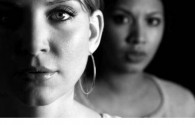OIWG
Job description: St Mungo's Client Representatives at St Mungo's
Areas of interest: Housing and homelessness – services for women with complex needs, Domestic abuse, Families and children – including relationships, Substance use, Women involved in the criminal justice system, Mental health and wellbeing, Childhood trauma – including being in care or childhood abuse, Employment and skills, Improving support for women involved in prostitution
OIWG's Recent Activity
"Quotes from women's peer research on judgement/stigma:
'Stuff had been written about me from a previous hostel about me being a sex worker, it was then passed on to here which I disputed because it wasn't true. In the past I had been, yes, but this is going back a long, long time, before I even had a drug problem funnily enough...it was quite annoying to have something written down in black and white about you that isn't true.'
'They're concerned (local vulnerable adult team etc). Warning notices are issued but they don't really help. I feel penalized when the wrong conclusions are drawn.'"
Reply To: Women involved in prostitution*
"Quotes from St Mungo's Women's Peer Research 2013 on difficulties staying in same area when trying to move on:
'I would like to move outside this area as well because I think maybe, you've got to bear in mind that I've sex worked here and used in here and I've lived here for a number of years so I'm known to a lot of people so even when I try to change my life people know me so there's always going to be that continuous persuasion, temptation and people trying to lure me back into that lifestyle.'
'It’s difficult because I'm faced with people who try to offer me drugs on a daily basis, and people who know my past - I'll be walking down the road and I've had men who know me from the past and they've tried to stop me in the street, begged me to take a lift from them, asked me for my number and tried to lure me back into that way of life. [Must be quite difficult?] Yeah, it is.'
'Years ago, it was very difficult to go past areas where I used to sex-work, even going to the drugs service. It is very hard for girls who are still working, too many distractions'."
Reply To: Women involved in prostitution*
"“I have worked on the streets and been cared for by One25 for over ten years now. In that time on those dangerous streets they gave me daily love, care and respite from the chaotic lifestyle that I was caught up in. I would like to express my immense gratitude to them and to the [St Mungo’s] Women’s Hostel crash pad staff for their outstanding support. It very probably saved my life and enabled me to come into recovery and start making changes in my life.
“I am now six months clean and sober and I no longer work the streets. My life has changed beyond belief! I feel that without the support of One25 and the use of the crash pad when I was homeless and vulnerable I would not be where I am today. A million thanks.”
For more information see: http://rebuildingshatteredlives.org/chloes-story/"
Reply To: Women involved in prostitution*
"Comments from the Outside In Women's Group held at North London Women's Project on 24th October 2013:
'The best way to support women into employment is to brainstorm what they are good at and what they enjoy, then for women to have a go at different tasks to see how they get on and pinpoint what they want to do.'
'It really depends on the individual, some come into the hostel and just want to live the same life and stay the same rather than take new opportunities. For me, I need to sort my financial problems before I can look at work, but there is a good amount of courses available.'
'Travel is a real barrier for some women. Not even looking at cost, it is still stressful to travel across London. One woman is going to a course in Bermondsey and it takes her an hour each way. It is good to have a mix of in-house and external courses that women are encouraged to attend and posters displayed. For some women they are thinking about their addiction day to day, so it is better to have a flexible approach of activities.'
'Consistency of staff is important, I have had lots of different key workers and this can mean you make progress towards training / employment but then this is lost with the next worker.'
'The main thing is to know what to do, what are the options, and preparation through volunteering- that helps to build confidence. I have been volunteering in a number of places.'
'I have done work in hospitality and catering but it was not constant, I would like to do it again. There is lots to do in London, women just need to find what they enjoy'."
Reply To: Skills and Employment
"Quotes from St Mungo's Women's Peer Research 2013:
'Yeah, I have been supported around that. [It’s difficult when you’re in a using hostel]. I’m actually in a day programme so I go, they do every day an abstinence programme then I come back here every evening and the weekend so it is very hard but my thought I had is I’d rather do that than be taken away somewhere and then be thrown back into this environment – I’m just testing it and seeing how it works. If it doesn’t work, I’ll have to think of another option.'
'It’s difficult because I'm faced with people who try to offer me drugs on a daily basis, and people who know my past - I'll be walking down the road and I've had men who know me from the past and they've tried to stop me in the street, begged me to take a lift from them, asked me for my number and tried to lure me back into that way of life. [Must be quite difficult?] Yeah, it is.'
'I don't feel like my drug project interact with the house where I live. Like, if I've got a keyworker at my drug project and a support worker at the house then I feel like they should be engaging because one is supporting me in terms of my accommodation and the other's monitoring my drug use and supporting me around it, so I do feel they need to be engaging.'
'I need to be out of the hostel environment to maintain control of drugs and alcohol.'"
Reply To: Substance use: helping women with drug and alcohol problems
"Quotes from St Mungo's Women's Peer Research 2013:
'I think they help women a lot with that. They help them find their rights and the best way of going about things, the best way to deal with social services who do have a very bad opinion of women who've been abused, they think they can't be mothers'
'Children are allowed here, if notice is given, forms filled out etc. If its my nephew visiting a staff member has to be present if his mother isn't.'
'[They’re allowed but] would be nice to have children in more private parts of the project.'
'Rules on age of children visitors needs to be opened up.'"
Reply To: Children and families: improving support
"Quotes from St Mungo's Women's Peer Research 2013:
'They offered counselling to me before and I said no and then my keyworker said it might be good for me to speak about it, so I said yes. They even offer art therapy. So there's two of them, one comes on Tuesday and one on Thursday and they offer sessions to the residents, people just put their names up for it. [You find that helpful?] It depends, its actually quite fun because you can talk about what you've gone through and then I remember there was the sound of a train and you put a couple of objects in and I didn't think of it but the lady herself she kind of connected what had happened to me with what had happened to the image and I hadn't really thought of it like that so she gave me a clearer picture. They get quite fun, she brings all materials with her, crayons, paints.'
'I did a workshop for domestic violence when I was at one project. I got a certificate upstairs and they've asked me to do peer mentoring for it.'"
Reply To: Prevention and recovery from domestic abuse and sexual violence
"Comments on Mental and Physical Health from St Mungo's Women's Peer Research 2013:
'On the ball with that here definitely, if they notice someone's not feeling very well or they've not seen them for a few days they check if you're OK, if they know you're not feeling well they get you to call the doctor.'
'Support is variable in different homelessness projects especially on mental health. If you don't possess a diagnosis and aren't on meds some staff don't recognise a problem and can be very unsympathetic'
'Some support services have a lack of knowledge of eating disorders.'
'Can refer me (mental health) to someone. As to physical health, they come with you if you need to go to the hospital or dentist which is good, other places don't do that.'
'you can always talk to someone if you feel down'."
Reply To: Mental health and wellbeing
"Quotes on employment ambitions from St Mungo's Women's Peer Research 2013 below. Of 60 women interviewed, 83% wanted to get into employment.
'What I want is to be with family, work and spend time with son, have a happy life'
'Yes I want to work. I’d like to do a job that gives back help to the community'
'Yes. I am going to be a teacher'
'Yes I would. Would like to work in leisure/ sports but wouldn't mind trying youth work. Haven't worked before'
'Yes I want to work as being on benefits is embarrassing. Any job will do.'
'I want to get into business. [What would you do?] Open a restaurant.'
'Yes I do want to work. I have done hairdressing and barwork in the past. Also, I’ve recently started to study economics'
'I have a serious back injury which prevents going back to my old job (was a cleaner and did other manual work). If I could work in a lighter field, catering or something, I would like to.'
'I'm sick. I do want to get back to work but I've been signed off because I was ill due to mental health issues. I'm a plumber, I've got a trade and I want to get back into that but it's going to cost £4k and I've looked into it and they won't help me with any of it. Which is daft really.'
'Yes, but I feel discriminated against (and have been in interview scenarios) on account of my mental health. I feel mental health problems are not considered a 'proper' disability . I would like to make money from my music/ recording.'"
Reply To: Skills and Employment
"One female St Mungo's resident's view:
'I don't think services address childhood trauma. My childhood was a bit messed up until about 3 or 4 years ago really. When I first came into homelessness services the focus was on sorting out the practicalities of moving forward rather than mentally looking back. I was lucky that I had already made contact with a therapist previously. I think access to therapy (like St Mungo's LifeWorks) is key. When you get to that stage in life when everything is dislocated, it is because of a long history of events- life doesn't fall apart in a day. For women experiencing homelessness, it is childhood trauma that fuels their issues such as mental health or substance use. It is futile to deal with the symptoms without looking at the Catalyst. I go to therapy every Tuesday and it has helped me a great deal- it is helping me move forward.'"
Reply To: Childhood trauma and women’s homelessness
"Comments from residents at the July St Mungo's Outside In Women's Group:
'I think to tackle childhood trauma we need more support for parents, even things like nutrition and how to feed children well. Growing up in an environment where you just get biscuits and things has an impact.'
'Things that happen as a child scar you for life. Moving on is about overcoming fear. Women need the option to talk about it but there needs to be no pressure, so they can start to deal with it but not be overwhelmed.'
'Talking to another woman needs to be an option for some, it might have been a man in childhood that did the abuse so they could be more comfortable speaking to a woman.'
'In my experience if someone opens up about their emotions then goes back to somewhere where they are lonely or isolated then this can do damage. We need social support alongside counselling.'
'Women should be able to access support groups around childhood trauma with other women so they no longer feel isolated and they don't feel judged and can learn from others. It is good to vent and even chat with a group of friends. In supported housing people have been through a lot. Counselling is not for everyone, and key workers should be able to help in a more informal way. I know from experience that not everyone likes counselling'.
'When I was a young woman in Holloway Prison I was pregnant and lost my baby to the care of my Mum while I was there. It was hard and I had post-natal depression- there was a programme called 'Journey' or something that I went to every week. It helped just to chat to someone. The woman was good and she helped, and I liked her because she reminded me of my mum.'"
Reply To: Childhood trauma and women’s homelessness
"One woman resident's view:
Support services and people in general are not very aware about self harm. People have said to me that I am doing it for attention, or that I am a sadomasochist and enjoy the pain.
The same goes for eating disorders. In one homelessness service I needed an urgent referral related to my eating disorder and they just gave me details of a website to look at to follow up myself. Because homelessness service mainly cater for men I think they are not well equipped or knowledgeable on this area. Sometimes the men say they have an eating disorder but actually they are not eating because they are on drugs. Staff assume that eating issues are to do with alcohol or drugs. One alcohol service told me I didn't have an eating disorder and it was just because I was drinking, even though I was diagnosed previously.
Dual diagnosis is another difficult area because professionals on both sides think you are being awkward. They say that issues you have are just a product of something else, either the substances or the mental health, not recognising it is possible for them to occur at the same time."
Reply To: Mental health and wellbeing
"Comments from the Outside In Women's Group held at St Mungo's women's semi Independent accommodation project, Chepstow Villas:
‘I have had good and bad experiences with police. On one occasion even though I was thrashing about and being aggressive, the female police woman understood why so was patient with me. The first time I was arrested a police man who was 6 foot 3 tackled me to the ground, I am small so that was really unnecessary force, he physically hurt me quite badly.’
‘We need to do more work to find out why woman are offending, and actually listen to the reasons’
‘We need more female bail hostels, in Luton there was one male one but none for women so it was more of a struggle to find accommodation on release’
‘I think there is an increase of young women being involved in gangs, sometimes it starts with them going out with a gang member but they can get drawn in and become full members. The drugs and violence involved leads to offending / homelessness’
‘When I was in prison I did a detox from alcohol but when I came out I was housed with other drinkers and this made me relapse’"
Reply To: Women, homelessness and the criminal justice system
"Feedback from a focus group at a St Mungo's women's semi-independent accommodation project, Chepstow Villas:
‘I think it is important to have a balance of women only and mixed environments, I live in a women only accommodation project so I am happy with the fact that the treatment service I go to is mixed. There are certain issues that it is better to talk to other women about such as pregnancy and women’s health issues.’
‘People use drugs to cover up what’s wrong. Sometimes they need counselling, sometimes medical intervention too. I was with a guy who was using heroin and he could be really horrible, only focussed on getting money for drugs. He once beat me so that I had to have 4 stitches under my eye. He said things like ‘I would like to go to prison- at least they would look after me properly there’. Men should have access to counselling and support too. I think also if both partners in the couple have some kind of meaningful occupation to take their mind off the nihilistic frustration, this can really help and take the focus off fighting all the time.’
‘I won’t stand for any male bullies now and neither does my project worker. Women feel powerless to stop it but just need to speak out and communicate to officials. In the past I have accessed refuges very quickly. It is a shame that the police need to see bruises before they believe it is going on – there needs to me more early intervention. I know of a woman who was sexually abused as a child and then was in a relationship and was murdered. These things make me very sad.’
‘Sometimes when a woman is in a relationship with another person who is using drugs, their partner prevents them from going in to detox. I knew one case where the woman’s partner was arrested for something and then while he was in prison she decided she did want to go into detox and really got her life together. She also met someone else so by the time he was released she had moved on. Treatment services don’t usually work with couples together, however I knew one couple where this was done successfully, this was because there was no abuse or violence involved and they had been together for many years.’"
Reply To: Substance use: helping women with drug and alcohol problems
"The Outside In Women's Client involvement Group meet every month in different St Mungo's hostels. At the January meeting women discussed their experiences of drug or alcohol treatment:
‘Women have always had a bad deal economically. This is the biggest issue in recovery from drug or alcohol problems and homelessness, access to employment and being able to move on and support yourself independently, I think there are a lot more options for men.’
‘I access an alcohol service and have half an hour to talk about a ‘drinks diary’. I don’t find it very helpful as it is not enough support. For women who have been through so many hardships, it is no wonder they turn to drink. It is really hard to come off drink or drugs when you are in a hostel. It sounds silly but the worst thing is not having enough, so you end up going out to look for money and spiralling into debt. I would like to have an allocated amount of alcohol in stock each week and then try to reduce, rather than have to go out and look for money to buy more.’
‘For me I don’t mind being in mixed treatment services, the biggest issue is that there are not enough choice in types of treatment is available, if I had lots of money then there would be other options, but because I don’t the only offer is methadone. The treatment service workers and my GP don’t listen to me in terms of what I want. I have explained that I can get by on a lower dose of methadone and only pick it up once a week but they haven’t listened. Instead I am on a programme to pick it up three times a week and purposely miss one of the appointments and get buy on two. It feels like a problem with the power balance.’
‘There is a lack of long term support when you have moved on from a hostel and on methadone. The only option if you don’t have money is NA and I don’t agree with their philosophy.’
‘The one problem being a woman in treatment is men latch on to you. Sometimes women can be exploited when men put them to work begging or selling sex to fund their habit.’"
Reply To: Substance use: helping women with drug and alcohol problems
"Resident's views:
‘When it comes to violence and abuse there is a problem that often it is the woman’s word against the man’s and he will say he didn’t do anything. There needs to be good CCTV in all mixed support projects so there is more evidence to back women up.’
‘I was staying in one homelessness project previously where a man kept climbing up the outside of the building onto a female resident’s balcony, when she reported to staff they talked to him and took his word over hers that he didn’t.’
‘Women need to support each other more and encourage each other to report harassment’
‘It takes a lot to report abuse or something like rape so women don’t make these things up. If they feel they are not believed then it makes it more likely that they will not report it again. If you look at the statistic on false allegations of rape they are really low compared to other offences.’
‘It is not just about domestic and sexual violence, women experiencing homelessness are subjected to intimidation and all kinds of creepy behaviour, a guy once asked me whether I would prefer to be raped or killed so I just quickly left the room.’"
Reply To: Prevention and recovery from domestic abuse and sexual violence
"Comments on housing and homelessness from St Mungo's resident's at the Outside In Women’s Group 21/08/12"
Reply To: Housing and homelessness – services for women with complex needs
"Views from residents at Wix’s Lane Women’s Drop In Session attached
"
Reply To: Housing and homelessness – services for women with complex needs




